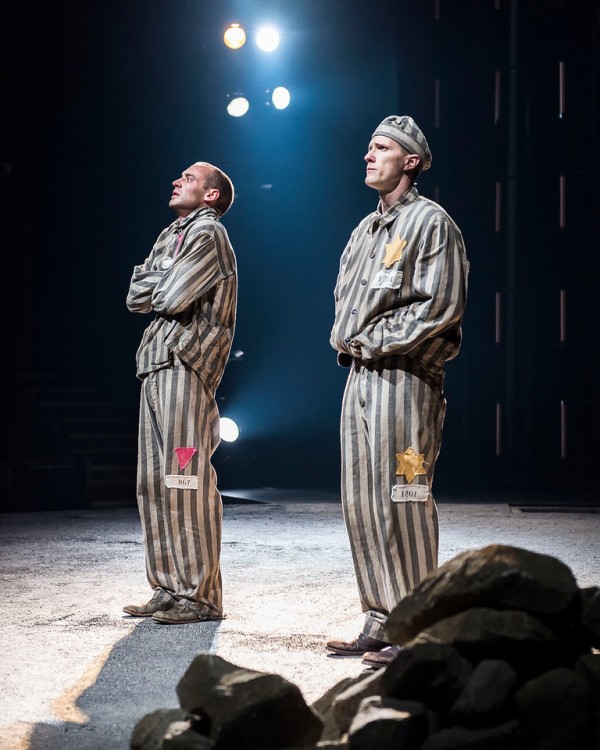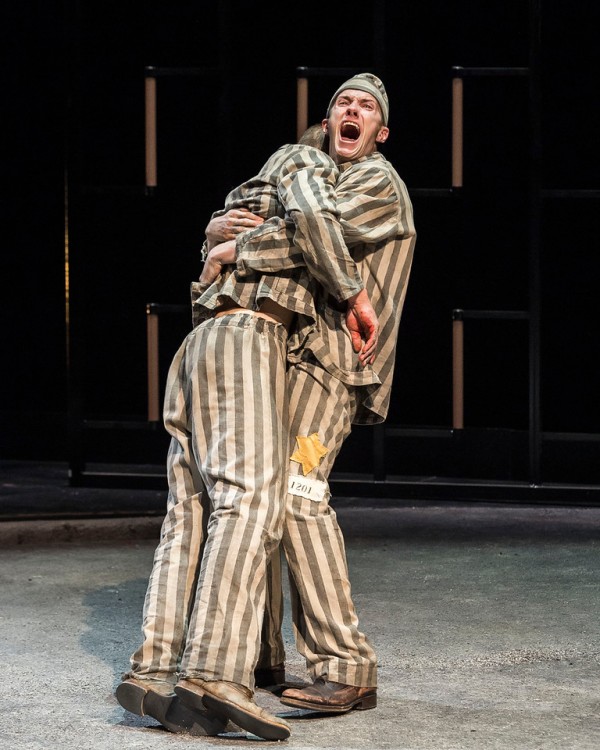When the news broke months ago that Center Theatre Group was reviving the 1979 Martin Sherman play Bent, the immediate question that came to mind was why. Bent was very much of its time. It made an impression because of its twin subjects: the Nazi treatment of homosexuals (a post-war revelation) within the context of the Holocaust in general.
But a lot of blood, tears and triumphs have been acknowledged since. We have revisited the Holocaust many more times, and homosexuality is now both officially and more broadly accepted, at least in Western societies. In addition, the advent of the Internet and the saturation of the 24/7 news cycle have inured us to the cruelty perpetrated in every corner of the world. That does not minimize its horror, but the daily onslaught of such awful news, means that it now takes a lot more than that to really shock us.
When Bent achieved its initial success the subject was hot and heartbreaking. But seen through today’s lens, the play feels a lot tamer in both language and structure. Its focus on Nazi cruelty makes it very different from Mart Crowley’s 1968 The Boys In the Band, the first play to put overt homosexuality and its angst on stage. But it comes nowhere near the coiled impact of Tony Kushner’s towering Angels In America or the powerful dramaturgy of Larry Kramer’s The Normal Heart, a post-AIDS cri de coeur that has transcended its period because its characters were so fully and humanly drawn.

The play depicts the short unhappy life of young Max (Patrick Heusinger), a reckless playboy who lives in a clandestine gay relationship with Rudy (Andy Mientus), a dancer, in the dangerous Weimar Republic of the 1930s. Nazism is on the rise and Max and Rudy, who work in a nightclub, are trapped when Max, in a drunken state, invites Wolf (Tom Berklund), to join them in a sexual threesome.
Wolf turns out to be the lover of a deputy to the head of the Hitler’s storm troopers, and the three men are apprehended by the Gestapo. Wolf is killed and Max and Rudy, on the run, attempt and fail to leave the country before they are arrested and destined for the death camps. Rudy is beaten to death before boarding the train — and Max rides in on his own.
At Dachau, deal-maker Max manages to get himself a yellow star designation as a Jew (after being forced to prove it in a particularly depraved manner), and is relegated to the job of endlessly moving rocks from one pile to another. His rock-hauling partner (Max had something to do with getting him there) is Horst (Charlie Hofheimer), a prisoner whose badge is a pink triangle, denoting him as gay. They’re not supposed to converse during their Sisyphean tasks, but of course they do, and though they cannot touch, they bond and even fall in love.

This all may sound very dramatic, but the play’s circumstances get in the way. The most vivid scenes are the early ones, when these guys have a chance to be engaging and funny and display real personalities and relationships — to each other, to the interloper Wolf, to Greta (played by Jake Shears of New York’s Scissor Sisters), the gay owner of the bar where they work, an enigmatic man who finds safety in a dry aloofness.
But the second act of Bent is another story. Much of its action is nonaction (carrying rocks back and forth and talking, talking). If it is not clear why CTG’s Michael Ritchie chose to put Bent on his Taper season. It is even less clear why the director, Moisés Kaufman, who memorably gave us Gross Indecency: The Three Trials of Oscar Wilde (1998), The Laramie Project (2000) and I Am My Own Wife (2003), made some of the choices he did.
Kaufman has staged Bent on a large, strangely shaped movable platform — Beowulf Boritt is the designer — that serves several purposes in act one (apartment, nightclub, park, train station). In the second act, it rises ominously on one end to become a huge scaffolded tower that, inexplicably, is put to no use at all. It might have added tension as a watchtower. Dramaturgy dictates that something as overbearing as that should play a role. It was not given one beyond its menacing presence.
Even though the German Captain (Hugo Armstrong) has specifically instructed Max and Horst, several times, not to “lay about” because he “sees everything,” the two men seem oddly relaxed, almost oblivious to danger, as they carry rocks, hardly concealing their conversations and making no pretense of crossing paths in silence. Even the key scene when, at rest, they put themselves into a mental trance that allows them to make love to the point of orgasm without touching, is curiously devoid of suspense.

How can that be? Perhaps because the play invokes emotion more than it evokes it. This flatness harks back to a script that has lost whatever urgency it may have had in 1979. Bent was a success on Broadway in spite of mixed reviews and Sherman has acknowledged that it never found much of a life beyond. This revival is the first in a major regional house.
Again one must ask why. Even if the events are not inconsequential, the writing remains sketchy and the characters only superficially penciled in. The German officers we meet seem to have stepped out of a 1940s wartime B movie. And the faux-cabaret song written by Sherman and sung to new music composed by Shears is, well, faux. Why not go for the real, grating, guttural German cabaret?

The play does have a powerful ending. It presents a major opportunity for a good designer to conjure up a jolting vision of the heart-rending catastrophe that happens. Yet here again Kaufman has chosen to end it with a whimper instead of a bang.
A final image, projected in terrible silence, of a collection of Holocaust victims lifted off museum walls, intensifies a sense that the play rides on the calamity of the broader Nazi crime. If the title Bent tells us anything, it is that this play is about the cruelty leveled at homosexuals in particular. That would have been enough. Linking the two in this fashion diminishes both.
Top image: l-r, Charlie Hofheimer, Andy Mientus, Patrick Heusinger, Brionne Davis and Matthew Carlson in Bent, at the Mark Taper Forum.
All photos by Craig Schwartz.
WHAT: Bent
WHERE: The Mark Taper Forum, Music Center, 135 N. Grand Ave., Los Angeles, CA 90012
WHEN: Tuesdays-Fridays, 8pm; Saturdays, 2:30 & 8pm; Sundays 1 & 6:30pm. Ends Aug. 23.
HOW: Tickets $25-$85 (subject to change), available online at the CTG box office, at www.CenterTheatreGroup.org or at 213.628.2772. Deaf community & charge is at TTY: 213.680.7703 or at CenterTheatreGroup.org/ProjectDATE. Group sales is at 213.972.7231.
